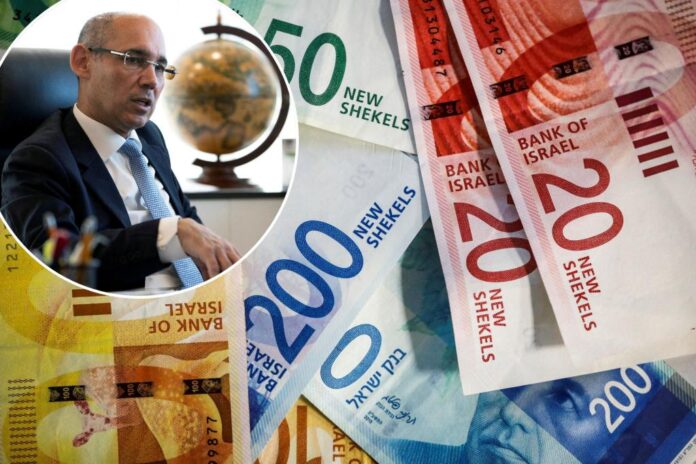
Israel’s economy was in excellent shape in the months before its war with Hamas.
But the fabric of Israeli society wasn’t faring as well.
The country had been torn apart by factions supporting the ruling coalition of Prime Minister Benjamin Netanyahu — and those who opposed his judicial reforms.
Mass protests became increasingly intense, and government support began to collapse as trust in Netanhayu’s ambitions took their toll.
A deep sense of desperation and uncertainty arose, not because Israelis feared a war with Hamas, but because they feared a war between themselves.
One public figure, however, remained above the fray, Prof. Amir Yaron, Governor of the Bank of Israel.
While barbs slung between Netanyahu and his adversaries, Wharton-alum Yaron maintained credibility from all sides of the political spectrum.
Which is why Netanyahu’s approval this week of a second Yaron term was greeted with a nationwide sigh of relief.
At a time of grave (and costly) national crisis, a new economic direction is the last thing Israel needs.
Divided as almost never before, Israel was caught off-guard by Hamas on October 7th.
The resulting war-cry saw some 300,000 citizen-reservists mobilized as rocket-fire brought the nation’s economy to a standstill.
Shopping centers emptied, factories shuttered, small businesses stopped functioning and employees stayed home by the hundreds of thousands.
Initial estimates put the cost of war at 1 billion shekels (nearly $300 million) per day.
But the news is not all bad.
In the face of existential crisis, Israeli society has united once again.
While the government scrambled to put relief policies in place, volunteer-run aid centers emerged to serve almost 150,000 internally displaced citizens.
Meanwhile, under public pressure, the center-liberal opposition party — led by two highly respected former military men — joined the government.
This enlarged war cabinet sent a clear message to the army and nation: Fight until victory; we will bear all the costs. Whatever it takes.
What it will take remains unclear — but Israel can pay for the conflict at least until the summer.
On the eve of its war with Hamas, Israel was sitting on an enviable $200 billion in foreign currency reserves and had less-than-zero net foreign debt.
The military budget took up five per cent of GDP — high, but not outrageous and lower than Saudi Arabia.
Living standards were rising quickly, annual per capita income neared $55,000 – almost three times greater than 20 years ago.
Although everybody complained about high prices, Israel was actually only expensive for tourists: real wages were booming, reflecting the success of a high-tech sector totaling $85 billion in 2022.
This all changed on October 7th. Along with that billion-shekel-a-day war effort, the cost to the rest of Israel is just as staggering.
Government assistance is now needed across nearly every element of society – for the firms struggling to stay afloat, the families forced into hostels and hotels, the more than 350,000 furloughed workers who need their wages covered.
For the moment, at least, Israel can afford these extra costs.
Total additional military expenditures are expected to hit 23 billion shekels ($6.2 billion) through the end of 2023, along with 33 billion shekels ($8.8 billion) in public assistance.
Overall, this will add at least 3% of GDP to 2023’s budget deficit.
This figure, while substantial, poses no major threat to Israel’s economy.
The real test, however, will come with the formulation of a new budget for 2024.
Budget-planning in Israel has always been fraught with politics as coalition partners scramble to appease their constituents.
Next year’s budget must be different: The focus must remain on funding the battle with Hamas – rather than placating cash-hungry politicians.
Ultra-Orthodox interests, for instance, received 250 million shekels (nearly $70 million) from Netanyahu earlier this year to support religious studies.
But with Israel mired in a costly war, the budget — like the reappointment of Yaron — must reflect this new national reality.
“Responsible and professional economic management is necessary to cancel immediate transfers of public money to goals that do not contribute to war effort or economic growth,” explained Prof. Zvi Eckstein, Head of the Aaron Institute for Economic Policy at Reichman University and former deputy Governor of Bank of Israel. In other words, shekels for soldiers, not special interests.
Such sentiments extend across Israel’s entire economic and business community.
Those millions of outstanding shekels promised by Netanyahu to his Orthodox coalition partners, for instance, they could easily be redirected to Israelis impacted by the conflict.
There are nearly 40 ministers serving in the current government – the most in Israeli history.
That number could easily be halved, saving the nation upwards of 5 billion shekels now needed in other areas of the economy.
At a moment when every shekel counts, any sense that the government is prioritizing political expediency over national interests could undo the fragile unity that’s emerged since October 7th.
And this, even more than the war, represents the greatest danger facing Israel’s economy today.
The Israeli people know very well what’s needed to win the economic battle it now faces: End political polarization and unite in pursuit of a common national goal.
Keeping Yaron with the Bank of Israel was a welcome first step. The next steps must be taken as soon as possible.
Sever Plocker is Chief Economics Correspondent for the Israeli daily Yedioth Ahranoth



